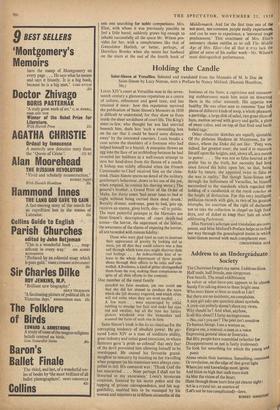Holding the Candle
Louis XIV's court at Versailles won in the seven- teenth century a glamorous reputation as a centre of culture, refinement and good taste, and has retained it since : how this reputation survived the publication of Saint-Simon's Memoirs in 1830 is difficult to understand, for they show us from inside the sheer sordidness of court life. The King's sister-in-law, who thought her son had married beneath him, deals him 'such a resounding box on the ear that it could be heard some distance away' by the interested courtiers. Louis breaks a cane across the shoulders of a footman who had helped himself to a biscuit. A marquise throws an egg into the face of an archbishop because he had revealed her baldness in a well-meant attempt to save her head-dress from the flames of a candle. A bishop was mildly offended when the French Commander-in-Chief received him on the clOse- stool. (Saint-Simon spares no detail of the military gentlwhen. emptied, eman's behaviour, down to his use of the pot, tO contain his shaving water.) The general's brother, a Grand Prior of the Order of Malta, for thirty years 'had never been to bed at night without being carried there dead drunk.' Royalty dresses, undresses, goes to bed,' gets up, receives an enema, gives birth, dies—all in public. The most powerfUI passages in the Memoirs are Saint-Simon's descriptions . of. court death-bed scenes—the horror, the enjoyment• of the li&Tor, the awareness of the shame of enjoying the horror, all are recorded with minute fidelity :
Those who were glad tried in, vain to increase
their appearance of gravity by looking sad or stern; yet all that they could achieve was a thin veil through which keen eyes might discover their real feelings. . . . An indescribable hint of re- lease in the whole deportment of these people shone through their efforts to be cairn and 'con- trolled. A liveliness, a kind of glitter distinguished them from the rest, making them conspicuous in spite of all tneir efforts to the contrary.
One member of the royal family paraded no false emotion, yet one could see that she did her utmost to produce the tears which she felt decency required, and which often will not come when they are most needed. . . . A few tears . . . were encouraged by artful rubbing to smudge her face and make her eyes red and swollen; but all the time her furtive glances wandered over the bystanders and scanned the faces of each one in turn.
Saint-Simon's book is the locus classicus for the corrupting tendency of absolute power. He pic- tured Louis XIV as a man of mediocre ability, great industry and initial good intentions, to whom flatterers gave 'a pride so colossal' that only fear of the devil prevented him allowing himself to be worshipped. He caused his favourite grand- daughter to miscarry by insisting on her travelling when pregnant (as his (mistresses were always com- pelled to do). His comment was : 'Thank God she has miscarried. . . . Now perhaps I shall not be thwarted in my excursions.' Louis's inveterate suspicion, fostered by his secret police and the tapping of private correspondence, and his sug- gestibility, enabled him to be managed by his women and ministers as to fifteen-sixteenths of the business of the State; a capricious and unreason- ing stubbornness made him insist on thwarting them in the other sixteenth. His appetite was healthy. He was often seen to consume 'four full plates of different kinds of soup, a whole pheasant, a partridge, a large dish of. salad, two great slices of ham, mutton served with gravy and garlic, a plate of sweet cakes, and on top, of that fruit and hard; boiled eggs.' Other character sketches are equally quotable. Of the plebeian Madame de Maintenon, for in- stance, whom the Duke did not like : 'Piety was, indeed, her greatest asset; She used it to maintain herself upon the heights; and, above all, as a mean/. to power. . . . She was not so false-hearted as to prefer lies to the truth, but necessity had long since forced the habit upon her, so that, being fickle by nature, she appeared twice as false as she was in reality.' But thotigh Saint-Simon saW thiough the hollowness of Versailles, he himself succumbed to the standards which regarded th e holding of a candlestick at the royal coacher as the height of distinction. For this very intelligent politician records with gle'e,'as two of his greatest triumphs, his assertion of the right of duchesses not to take the collection in chapel on high feast days, and of dukes to keep 'their hats di when addressing Parlement. • .t Miss Norton's selection and translation are cony petent, and Miss Mitfores Preface helps us to fin Our way through the genealogical rfnazes in whic Saint-Simon moved with such complacent ease.
CHRISTOPHER H I L














































































 Previous page
Previous page